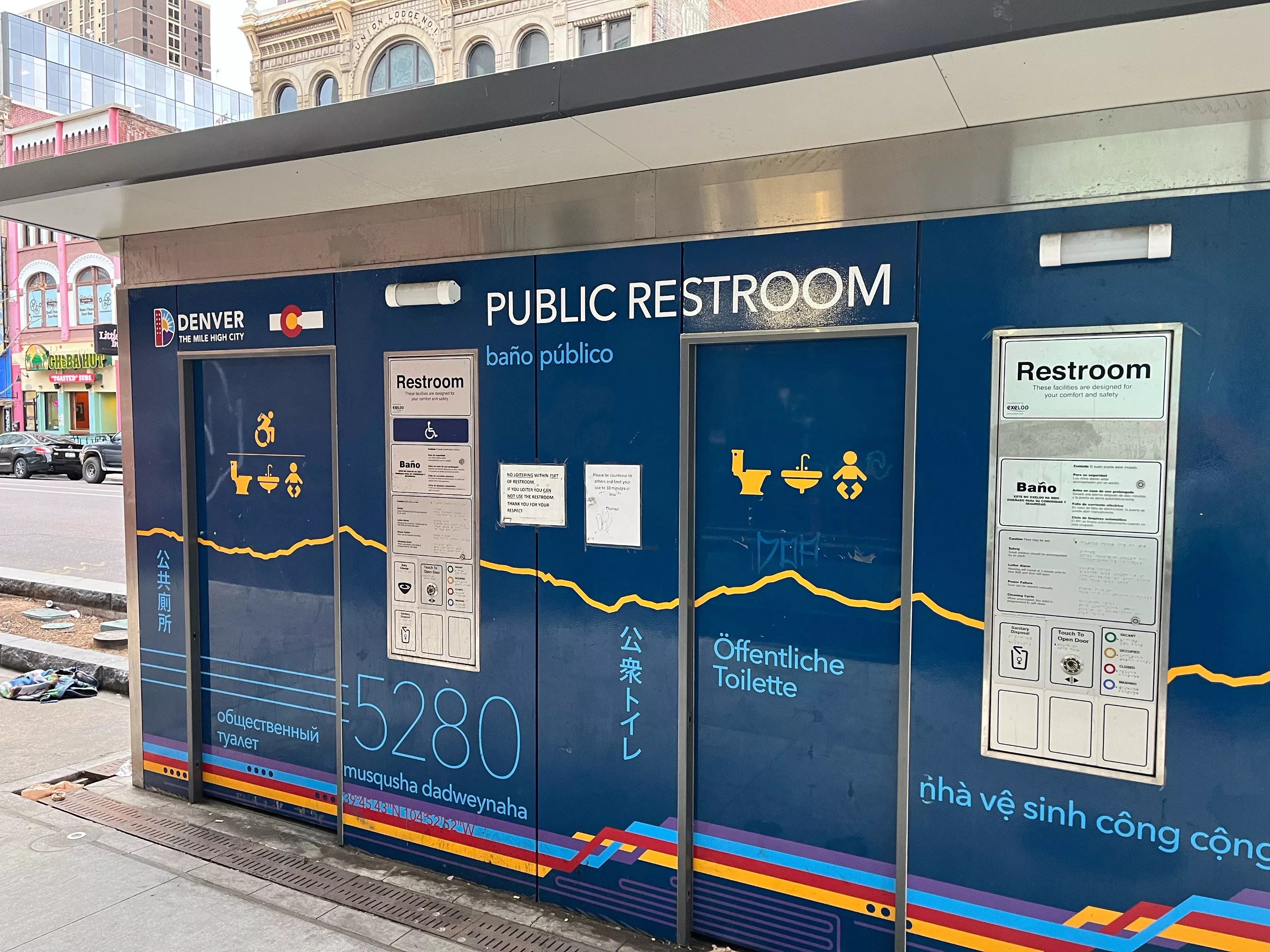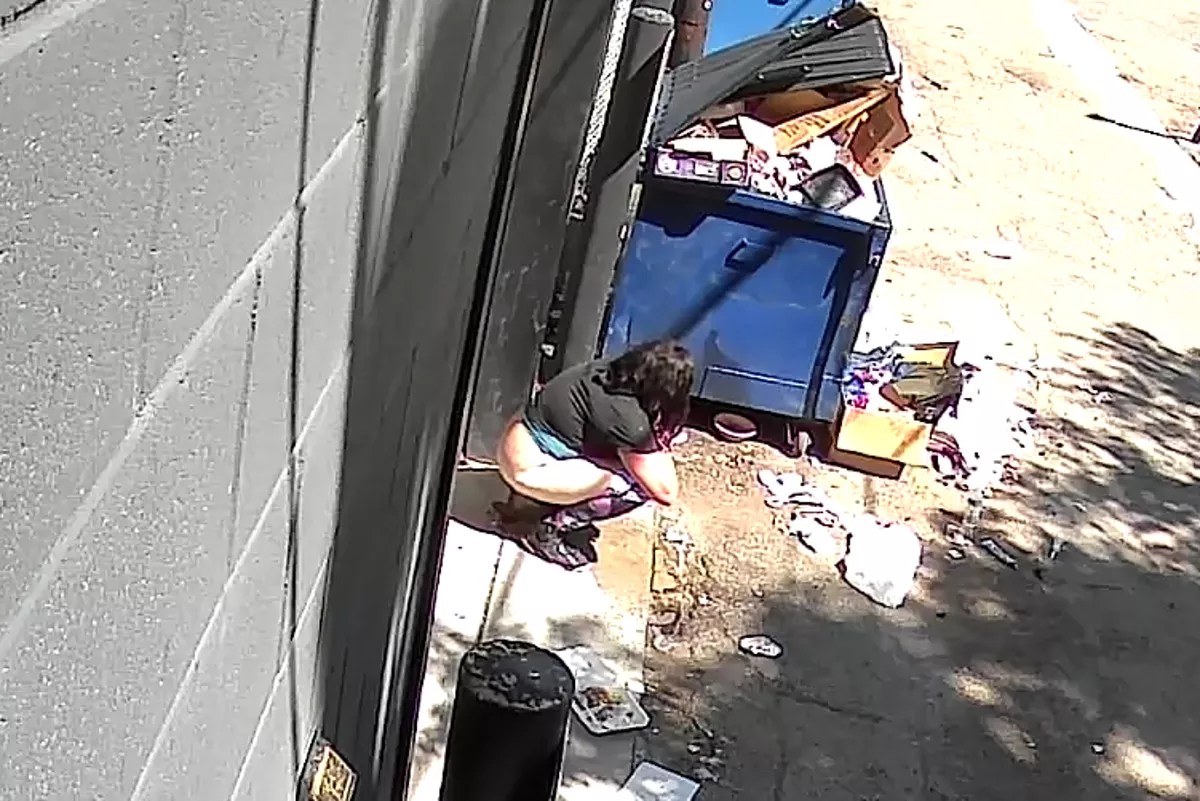
Conor McCormick-Cavanagh

Audio By Carbonatix
As an “exercise in empathy,” Emily Van Houweling – a researcher from Regis University – asks people to imagine that uncomfortable and urgent feeling when they suddenly have to find a bathroom.
“Maybe you were hiking or running or at the mall or at an amusement park, and you needed to go to the bathroom and couldn’t find one,” she said during a presentation on Wednesday, September 28. “That physical agony sometimes – that anxiety and perhaps even embarrassment if you had to go someplace you didn’t want to go: Picture that as your everyday reality.”
Researchers from the University of Denver and Regis University studied access to toilets and running water in Denver and found that bathrooms were “hard to find, often closed or controlled by gatekeepers,” according to a recently published report titled “Access to Water and Toilet Facilities for the Unhoused in Denver.”
Van Houweling was a co-author of the report, which was published earlier last week by the Housekeys Action Network Denver, along with Renee Botta, a researcher from DU. They took a survey and mapped out the public restrooms in the Mile High City, with their data showing that Denver has a dramatic shortage of bathroom access for people living on the streets.
“Everyone can empathize with that need to go to the bathroom when you can’t find one,” Van Houweling said. “You probably take for granted that you’re going to find a bathroom that is safe and comfortable and private.”
The survey took responses from nearly 200 homeless people in Denver from 2020 to 2023 and found that 77 percent of them considered finding a bathroom in the city to be a challenge because they’re scarce, dirty and extremely dangerous at times.
“There is no public restrooms available anywhere, it is really frustrating,” a survey respondent told researchers. “Eventually you come to a point where you don’t care because you don’t have nowhere to go, you go in the bushes, it’s embarrassing.”
Half of the respondents said they have to “hold it” every day, per the report; three out of four said that finding a bathroom every day was a challenge; 82 percent said they have to travel more than two blocks to find a bathroom; two women said they were sexually assaulted while trying to use a public bathroom.
“My PTSD from being raped is really bad, and I get really triggered around men,” a homeless woman told researchers. “Like the Porta Potties, there are a lot of men around them, and the men are terrible around there. They call me names like ‘bitch,’ and it’s just terrible there.”
It takes a homeless person twelve minutes, on average, to find a bathroom in the city, the report found.

A woman was caught on camera pooping by a dumpster outside a business near 22nd and California, the site of one of Denver’s largest encampments.
Security camera footage
“Without access to public bathrooms, people had to resort to whatever they can do,” Van Houweling said. “Almost half of respondents – almost half – did not use any facility. They often use the tents, an outdoor place, an alley or a dumpster. No one wants to have to go outside or go in your tent, but there’s nowhere to go. And then they’re blamed for it.”
The city’s homeless policies either aren’t helping or are making the situation worse, according to Van Houweling, as the camping ban and sweeps are examples of an action that “makes it really difficult for people to access bathrooms,” she said.
“[Sweeps] disrupt the service access that people may have if you found a place where you could rely on to get water or use the bathroom, those relationships, those networks, those service providers,” Van Houweling added. “Denver is providing no services at the encampments. They started with some trash recently, but in terms of water, showers, toilets, none have been provided at encampments.”
Sweeps can be carried out on short notice for public health reasons; that was the case with the first sweep of Mayor Mike Johnston’s administration, which had to do with rats.
Still, Van Houweling noted that in recent years, “the justification for a sweep is often grounded in a public health perspective, where the unhoused are blamed for the sanitation and hygiene issues, when in fact there’s no place for them to take care of themselves.”
The most recent sweep by the City of Denver happened at one of the few encampments where porta-potties were installed and regularly cleaned – at Eighth Avenue and Logan Street, in front of the Governor’s Mansion, according to Van Houweling.
The City of Denver inked a $975,000, three-year contract with Honey Buckets, a porta-potty company, to set up and service toilets and hand-washing stations wherever a city agency requests one. City council approved the contract in June.
The city’s Finance Governance Committee is revisiting the contract again on Tuesday, October 3, with an eye toward expanding its terms. The city says it expects to increase the maximum budget for the contract to $7 million because of a greater need at Safe Outdoor Spaces, such as micro-communities.
“The approval of Safe Outdoor Spaces has created a need citywide to provide port-o-let and hand wash station rental services at these sites as well,” according to city documents. Micro-communities are a central part of Johnston’s plan to move 1,000 homeless residents into housing by the end of the year.
Porta-potties at Safe Outdoor Spaces are “cleaner and safer than other bathrooms in Denver,” according to the HAND report, and “gave residents all-day access.”
The bathrooms at shelters offer “better access to water and bathrooms,” per the report, but the homeless residents surveyed said they “were generally not satisfied with the toilets provided there.” Shelters also had “limited hours and residents were often left without water or bathroom access when they closed,” according to the report.
The city expects to spend more on portable toilets as the Denver Department of Parks and Recreation plans to increase the numbers at parks and clean and replace them more often. Mayor Johnston is looking to spend $1.2 million in 2024 on renting and maintaining portable toilets – up from $716,000 in 2023.
With the porta-potties and public bathrooms currently in parks, however, “cleanliness was a major problem,” according to Van Houweling. The lack of places for Denver’s homeless to take care of business is causing emotional, mental and physical damage as well, she notes.
Out of the homeless individuals surveyed, 28 percent reported a health problem “directly related to poor access” to bathrooms like “skin infections, [urinary tract infections], bladder infections, stomach issues, dehydration,” and even potentially fatal issues like Hepatitis A, dental problems, heat stroke and “really serious health consequences from this,” Van Houweling said.
As far as mental health and emotional well-being, “People talked about being anxious, stressed out, afraid, depressed because they couldn’t find these facilities,” Van Houweling said. “It was a constant stress thinking about this everyday, and a loss of dignity and embarrassment that comes with this.”
The report, however, does offer recommendations: more bathrooms, making sure they’re all working and clean, requiring shelters to keep bathrooms open 24/7, and putting up signs and maps of where bathrooms are.
“It’s unnecessary to have this much difficulty for humans to have access to water, toilets and hygiene,” the report concludes. “We’re not a third world country, everyone deserves to be taken care of, respected and acknowledged.”